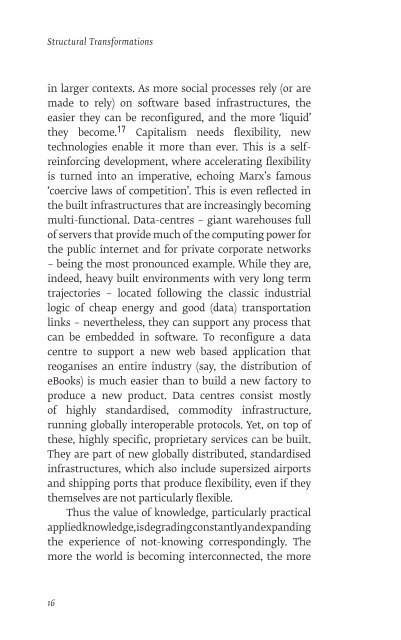KTub8
KTub8
KTub8
Create successful ePaper yourself
Turn your PDF publications into a flip-book with our unique Google optimized e-Paper software.
Structural Transformations<br />
in larger contexts. As more social processes rely (or are<br />
made to rely) on software based infrastructures, the<br />
easier they can be reconfigured, and the more ‘liquid’<br />
they become. 17 Capitalism needs flexibility, new<br />
technologies enable it more than ever. This is a selfreinforcing<br />
development, where accelerating flexibility<br />
is turned into an imperative, echoing Marx’s famous<br />
‘coercive laws of competition’. This is even reflected in<br />
the built infrastructures that are increasingly becoming<br />
multi-functional. Data-centres – giant warehouses full<br />
of servers that provide much of the computing power for<br />
the public internet and for private corporate networks<br />
– being the most pronounced example. While they are,<br />
indeed, heavy built environments with very long term<br />
trajectories – located following the classic industrial<br />
logic of cheap energy and good (data) transportation<br />
links – nevertheless, they can support any process that<br />
can be embedded in software. To reconfigure a data<br />
centre to support a new web based application that<br />
reoganises an entire industry (say, the distribution of<br />
eBooks) is much easier than to build a new factory to<br />
produce a new product. Data centres consist mostly<br />
of highly standardised, commodity infrastructure,<br />
running globally interoperable protocols. Yet, on top of<br />
these, highly specific, proprietary services can be built.<br />
They are part of new globally distributed, standardised<br />
infrastructures, which also include supersized airports<br />
and shipping ports that produce flexibility, even if they<br />
themselves are not particularly flexible.<br />
Thus the value of knowledge, particularly practical<br />
applied knowledge, is degrading constantly and expanding<br />
the experience of not-knowing correspondingly. The<br />
more the world is becoming interconnected, the more<br />
16


